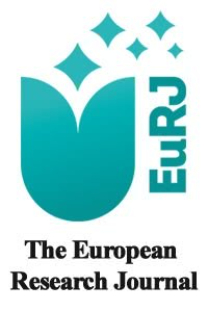Cytokines – major molecular messengers orchestrate between inflammation and cancer
Interleukin-8, interleukin-10, TNF-α, TGF-β, STAT-3 NF-KB,
___
- [1] Landskron G, De la Fuente M, Thuwajit P, Thuwajit C, Hermoso MA. Chronic inflammation and cytokines in the tumor microenvironment. J Immunol Res 2014;2014:149185.
- [2] Amedei A, Prisco D, D' Elios MM. The use of cytokines and chemokines in the cancer immunotherapy. Recent Pat Anticancer Drug Discov 2013;8:126-42.
- [3] Sadaf EZ. Role of inflammatory cytokines in inflammation and cancer. J Public Health Biological Sci 2013;2:173-82.
- [4] Lee S, Margolin K. Cytokines in cancer immunotherapy. Cancers (Basel) 2011;3:3856-93.
- [5] Anestakis D, Petanidis S, Kalyvas S, Nday CM, Tsave O, Kioseoglou E, et al. Mechanisms and applications of interleukins in cancer immunotherapy. Int J Mol Sci 2015;16:1691-710.
- [6] Burkholder B, Huang RY, Burgess R, Luo S, Jones VS, Zhang W, et al. Tumor-induced perturbation of cytokines and immune cell networks. Biochim Biophys Acta 2014;1845:182-201.
- [7] Hanahan D, Coussens LM. Accessories to the crime: functions of cells recruited to the tumor microenvironment. Cancer Cell 2012;21:309-22.
- [8] Paltridge JL, Belle L, Khew-Goodall Y. The secretome in cancer progression. Biochi Biophys Acta 2013;1834:2233-41.
- [9] Zhong Z, Sanchez-Lopez E, Karin M. Autophagy, inflammation, and immunity: a Troika governing cancer and its treatment. Cell 2016;166:288-98.
- [10] Haabeth OA, Bogen B, Corthay A. A model for cancer suppressive inflammation. Oncoimmunology 2012;1:1146-56.
- [11] Pages F, Galon J, Dieu-Nosjean MC, Tartour E, Sautes-Fridman C, Fridman WH. Immune infiltration in human tumors: a prognostic factor that should not be ignored. Oncogene 2010;29:1093-102.
- [12] Schetter AJ, Heegaard NH, Harris CC. Inflammation and cancer: interweaving microRNA, free radical, cytokine and p53 pathways. Carcinogenesis 2010;31:37-49.
- [13] Fridman WH, Pages F, Sautes-Fridman C, Galon J. The immune contexture in human tumors: Impact on clinical outcome. Nat Rev Cancer 2012;12:298-396.
- [14] Senovilla L, Vacchelli E, Galon J, Adjemian S, Eggermont A, Fridman WH, et al. Trial watch: Prognostic and predictive value of the immune infiltrate in cancer. Oncoimmunology 2012;1:1323-43.
- [15] Shalapour S, Karin M. Immunity, inflammation, and cancer: an eternal fight between good and evil. J Clin Invest 2015;125:3347-55.
- [16] Alvaliotis IL, Pateras IS, Papaioannou M, Glytsou C, Kontzoglou K, Johnson EO, et al. How do cytokines trigger genomic instability? J Biomed Biotechnol 2012;2012:536761.
- [17] Vesely MD, Kershaw MH, Schreiber RD, Smith MJ. Natural innate and adaptive immunity to cancer. Annu Rev Immunol 2011;29:235-71.
- [18] Meulmeester E, Ten Dijke P. The dynamic roles of TGF-β in cancer. J Pathol 2011;223:205-18.
- [19] Shrihari TG, Vasudevan V, Manjunath V, Devaraju D. Potential co-relation between chronic periodontitis and cancer - an emerging concept. Gulf J Oncolog 2016;1:20-4.
- [20] Korniluk A, Koper O, Kemona H, Dymicka-Piekarska V. From inflammation to cancer. Ir J Med Sci 2017;186:57-62.
- [21] Carmeliet P, Jain RK. Molecular mechanisms and clinical applications of angiogenesis. Nature 2011;473:298-307.
- [22] Tecchio C, Scapini P, Pizzolo G, Cassatella MA. On the cytokines produced by human neutrophils in tumors. Semin Cancer Biol 2013;23:159-70.
- [23] Chai EZ, Siveen KS, Shanmugam MK, Arfuso F, Sethi G. Analysis of the intricate relationship between chronic inflammation and cancer. Biochem J 2015;468:1-15.
- [24] Wilke CM, Kryczek I, Wei S, Zhao E, Wu K, Wang G, et al. Th17 cells in cancer; help or hindrance? Carcinogenesis 2011;32:643-9.
- [25] Zhang L, Feng D, Yu LX, Tsung K, Norton JA. Preexisting antitumor immunity augments the antitumor effects of chemotherapy. Cancer Immunol Immunother 2013;62:1061-71.
- [26] Chimal-Ramirez GK, Espinoza-Sanchez NA, Fuentes-Panama EM. Protumor activities of the immune response: insights in the mechanisms of immunological shift, oncotraining, and oncopromotion. J Oncol 2013;2013:835956.
- [27] Marata M, Thanan R, Ma N, Kawanishi S. Role of nitrative and oxidative DNA damage in inflammation-related carcinogenesis. J Biomed Biotechnol 2012;2012:623019.
- [28] Shrihari TG. Dual role of inflammatory mediators in cancer. Ecancermedicalscience 2017;11:721.
- [29] Lippitz BE. Cytokine patterns in patients with cancer: a systematic review. Lancet Oncol 2013;14:218-28.
- [30] Diakowska D. Cytokines association with clinical and pathological changes in esophageal squamous cell carcinoma. Dis Markers 2013;35:883-93.
- ISSN: 2149-3189
- Yayın Aralığı: Yılda 6 Sayı
- Başlangıç: 2015
- Yayıncı: Prusa Medikal Yayıncılık Limited Şirketi
Fazıl KULAKLI, Canan ÇULHA, Seval AKDEMİR
Primary cardiac B cell lymphoma
Alper KARAKUŞ, Hasan ARI, Selma ARI, Sencer CAMCI, Ahmet TÜTÜNCÜ
Open tibial pilon fractures: treatment with ankle-spanning Ilizarov fixator
Mehmet TÜRE, Ayfer GÖZÜ PİRİNÇÇİOĞLU, Alper AKIN, Hasan BALIK, Seçkin İLTER, Sercan YÜCEL YANMAZ
Primary cardiac B-cell lymphoma
Alper KARAKUŞ, Hasan ARI, Selma ARI, Sencer ÇAMCI, Ahmet TÜTÜNCÜ
Quadriceps tendon rupture associated with anabolic steroids and growth hormone: a case report
Nurdan ACAR, Cüneyt ÇALIŞIR, Evvah KARAKILIÇ, Engin ÖZAKIN
Celiacomesenteric trunk: A rare case
Elif ERGÜN, Pınar Nercis KOŞAR, Sonay AYDIN, Cihat TEK
Fazıl KULAKLI, Zuhal ÖZİŞLER, Canan ÇULHA, Kurtuluş KÖKLÜ, Sumru ÖZEL, Murat ERSÖZ
Selma UYSAL RAMADAN, Pınar Nercis KOŞAR, Sonay AYDIN, Fatma Dilek GÖKHARMAN
A rare complication related to H1N1 infection: Dilated cardiomyopathy
Ayfer GÖZÜ PİRİNÇÇİOĞLU, Mehmet TÜRE, Hasan BALIK, Sercan YÜCEL YANMAZ, Alper AKIN, Seçkin İLTER
